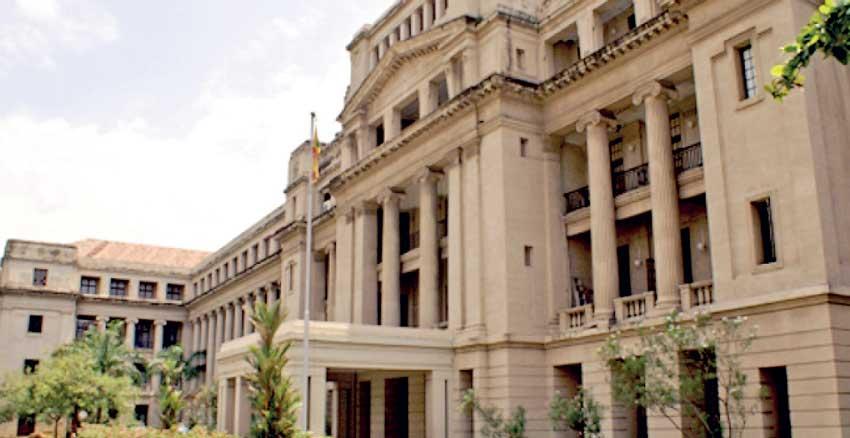Reply To:
Name - Reply Comment
Last Updated : 2024-05-21 07:04:00

 The government promises a non-traditional budget this weekend, as the nation awaits the details of a fiscal policy programme it hopes will spell the way out of the current economic crisis. Alongside impetus to drive production, entrepreneurship and investments, the government must give serious consideration to laying a foundation for revenue growth, which is critical to map sustainable long-term solution for the country’s economic woes.
The government promises a non-traditional budget this weekend, as the nation awaits the details of a fiscal policy programme it hopes will spell the way out of the current economic crisis. Alongside impetus to drive production, entrepreneurship and investments, the government must give serious consideration to laying a foundation for revenue growth, which is critical to map sustainable long-term solution for the country’s economic woes.
This current predicament is the result of successive governments pandering to politics and personalities and giving prominence to cultivating a welfare mentality amongst the people. They promised much more than they could hope to deliver. Sound advice fell on deaf ears, whilst some regimes seem blind to the geopolitical and economic developments across the globe that Sri Lanka can hardly afford to ignore. The situation was compounded by the pandemic, which has affected the global economy, just as much as here at home.
History has amply demonstrated that budget proposals could change up to the very last minute before presentation. However, it is anticipated the government will continue to hold corporate and income tax steady to give confidence to investments and boost savings. This would be a welcome move. The VAT threshold is also likely to be reduced for some segments to provide relief to consumers reeling from the spate of recent price hikes of essential items.
Though the removal of controlled prices is a politically unpopular move, in the long term this would benefit the market and even consumers. Governments cannot afford to provide subsidies for prolonged periods of time for a large variety of products as Sri Lanka has done. This contributes further to burdens on the exchequer. Markets must be allowed to determine the price based on production, healthy competition and affordability, which would ultimately lead to automatic correction in consumer behaviour and spending.
For instance, the government should allow imports of all types of fertilisers, impose higher taxes on chemical inputs and remove all subsidies. This would prompt farmers to balance fertiliser usage based on costs and output and determine the effective price for their products.
‘Sin tax’ or levies on alcohol and tobacco will likely be increased. Whilst this sounds plausible in Sri Lanka’s politically-biased moralistic system, this is likely to result in an increase in smuggling. The tobacco sector is the worst affected from excessive taxation, as the price hike of 2019 had resulted in flagging volumes and a drop in revenue to government. Consumption has not been affected due to the presence of illicit cigarettes, with Chinese and European brands flooding the market.
Whilst some economists point to a Rs.20 billion growth in revenue to the state from a potential Rs.20 increase, this will hardly be the case. Earnings will diminish, potentially between Rs.10 to 20 billion and public health and security will be compromised with the resulting growth in illicit trade.
The government must also focus attention on the domestic beedi trade, which is flourishing unabated, paying little heed to regulations on smoking. Whilst smuggling of sprits is comparatively lesser to tobacco, the government must focus more attention on improving its alcohol policy and distribution to grow revenue and curb the spread of illicit alcohol.
It is hoped restrictions on vehicle imports would remain as is, except for electric cars and vehicles that are deemed essential for public service and security. Sri Lankans are highly driven towards consumption. Development loans obtained under the guise of entrepreneurship are often spent on lavish vehicles and other modes of indulgence.
Whilst it is essential to promote entrepreneurship, a far more comprehensive but non-restrictive investment promotion scheme is needed to ensure development loans obtained are spent on intended measures.
The most crucial factor is enhancing government revenue. 2022 will not be the year for it as Sri Lanka and the rest of the world are on recovery mode but it can be the year that lays the foundation for a sustainable plan of action from 2023. The government needs to be bold with its measures to tackle public sector expenditure.
The country cannot afford any more excesses in the state sector in terms of jobs and even pensions. Countries like Singapore and others developed rapidly, due to strict and bold measures undertaken by their governments. It’s time for this government to embark on real measures to leave a positive mark on Sri Lanka’s history and their own legacy. Do what must really be done for the good of this nation.
(Kumar Ranaweera is an undergraduate of the Colombo University and serves as a Research Assistant with a leading auditor in Colombo)

Add comment
Comments will be edited (grammar, spelling and slang) and authorized at the discretion of Daily Mirror online. The website also has the right not to publish selected comments.
Reply To:
Name - Reply Comment
The state-run loss-making State Mortgage & Investment Bank (SMIB) has reveale
US authorities are currently reviewing the manifest of every cargo aboard MV
On March 26, a couple arriving from Thailand was arrested with 88 live animal
According to villagers from Naula-Moragolla out of 105 families 80 can afford
20 May 2024 - 0 - 108
20 May 2024
20 May 2024

18 May 2024